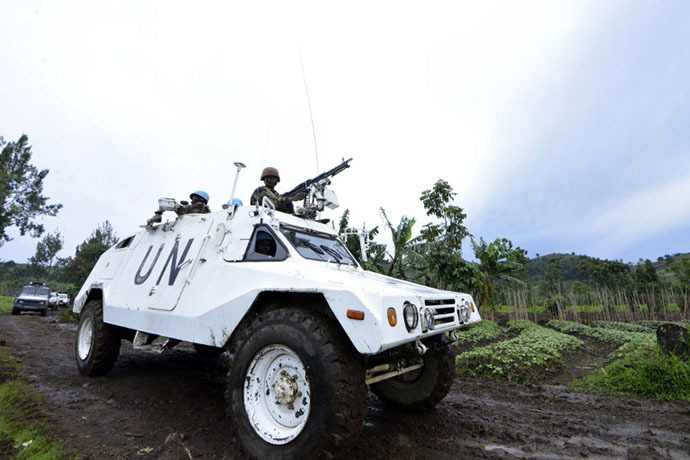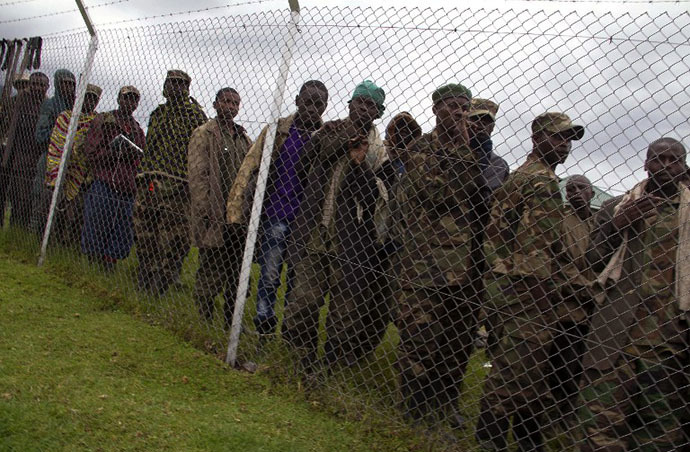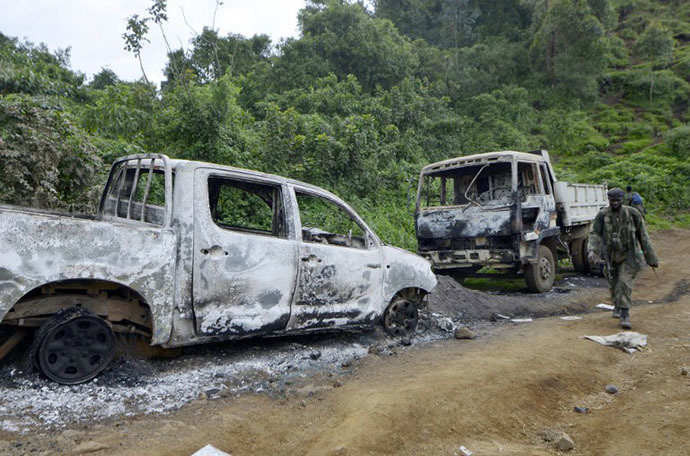Right now the situation in Rwanda, Uganda and DRC is unpredictable, but exceptionally volatile.
"The situation in Kigali is extremely tense, right now", an Asian diplomat based in East Africa, who asked not to be identified, explained to me.
"The atmosphere is also very confusing… Security is beefed-up and it is clear that something may happen any moment. There are rumors that the West may let Kagame fall soon and replace him with a more suitable puppet… And of course he knows; he is extremely smart, and cunning, unlike Museveni. That is why he is putting up fortifications around himself. He needs those M23 people around him, in case of war! He needs them back! It is almost certain that there will be a conflict here soon… Next year is the 20th anniversary of the 'genocide' and of the RPF taking over the country," he said.
Another regional showdown is most likely approaching. In East and Central Africa, what is called peace could actually be just another battle in a never-ending war.
M23 gangs are returning to Rwanda from Congo
The 'Defeat of M23' is perhaps orchestrated. The group is returning home to Rwanda only because it is most likely needed there.
Read the newspapers and you might well believe that everything is suddenly over. The barbaric bandit group, or 'rebel group', however you want to call M23, that brutal arm of Rwanda in the decades long war, which ravaged the resources-rich Democratic Republic of Congo, has suddenly sat humbly on its tail, whispering offers for a ceasefire, resembling some shamed and reformed puppy.
The bandits verbally accepted humiliating defeat, while promising to end its 'rebellion' and to use purely political means to pursue its goals. Finally, it surrendered, gave up least some weapons, and evaporated into neighboring Rwanda and Uganda.
It was also underlined that the United Nations finally unleashed its wrath and firepower, and after a long, many would say too long hesitation, its special forces joined the battle on the 4th of November, alongside the troops of the Democratic Republic of Congo.
Reports also suggested that this time there would be no mercy for the insurgents, and the M23 gunmen were pinned down in the hills bordering Rwanda and Uganda. They were shelled mercilessly and crushed. In the end, those who survived barely managed to cross the border and return to Rwanda, in order to seek support and even salvation from the hand that has been feeding them throughout all these long and bloody years.
The final peace accord has not been signed because the Congolese delegation refused to enter the ceremony room in the Ugandan capital, Kampala, claiming there is no point in signing any agreementin view of the fact that M23 no longer exists.
This is the story, or at least that is how the story has been told in London and Washington.
History of destruction
I know this area intimately, including the borders that M23 has been recently crossing. It is a beautiful part of the world, marked by majestic volcanoes and morning fogs, by humble villages, but also by a history so dreadful that it is often hard to narrate.
Volcans National Park on the Rwandan side, with Mount Karisimbi situated right on the borders with the Democratic Republic of Congo, is where one can spot, for an exorbitant fee, those enormous apes, the 'gorillas in the mist'. But there is also an enormous US surveillance antenna, which penetrates the clouds. It is some sort of semi-secret symbol of US-Rwandan 'cooperation', designed and erected to monitor all the activities on the other side of the range, in the crumbling giant full of natural resources that is DRC.
I am also acquainted with the city of Goma, the capital of what was once called the 'Riviera of Kivu'. It is a city on the shore of the majestic Lake Kivu, a place that is a real phenomenon; it's so full of natural gas it could explode at any moment without warning and perhaps kill tens of thousands of people.
Goma is the city that M23 ravaged one year ago. In November 2012, it scattered tens of thousands of petrified refugees to all corners of the region, including Rwanda and Uganda. Goma is where I once rotted in detention, several floors underground, interrogated by Congolese intelligence agents and where once two sets of competing border guards, Rwandan and Congolese, were each pulling me, right there on the line, to their respective countries to face arrest.
I am also familiar with the border crossing and towns at the frontier between Uganda and DRC, some 500 kilometers west of Kampala. Rugwerero village in the Kisoro district is just one of those messed-up frontier places.
When M23 was busy ravaging and raping East Kivu, in November 2012, I went there, driving all the way from Kenya. The entire area was then in turmoil. The Congolese army was deserting and crossing the border into Uganda, leaving its weapons at the border post. There were injured Congolese people in the local hospital, still in uniforms but with all insignia removed, refusing to speak.
But were these really soldiers, or injured M23 gunmen, coming to their Ugandan 'base' for medical treatment and fresh supplies? Nobody knew; everything was a blur. In the end I ended up meeting several obnoxious Rwandan heads of a desperate refugee camp at Kisoro, to witness how toothless and spineless the UN had become in the region They were unable to arrest the real perpetrators, because they were using their MI-8 helicopters to shuttle Ugandan officials (and who knows who else), between Kampala and the border, and was unwilling to get involved militarily.
There was heavy fighting all around, particularly at Bunagana, just a few steps into DRC. Bullets were flying and explosions were heard from several directions.
"People are coming here from Congo, with absolutely nothing", explained an official from the Kisoro local government, while I was filming. "M23 is destroying everything in its way…"
The war in Congo was once again displacing hundreds of thousands of people. Refugees were pouring into Uganda with nothing, or just with what they were able to carry: animals, dirty bundles containing personal belongings and even pieces of furniture.
The connection
By that time I was approaching the final stage of collecting footage for my feature documentary film,"Rwanda Gambit", a piece about the way Western mass media twisted the story of the 1994 Rwandan bloodletting, while being silent about how both Rwanda and Uganda have been used since then (or more precisely how they have been 'employed'), by Western political and economic interests.
The result was the unprecedented devastation and plunder of the most ravished nation on earth in modern history – the Democratic Republic of Congo (DRC), a country literally overflowing with everything Western business and governments dream about: from coltan that is used in our cellular phones, to uranium and diamonds.
Arthur Tewungwa, a Ugandan businessman and an opposition figure from the left, told me that "most knowledgeable observers of the problems pertaining to the eastern DRC are aware that Kagame and Museveni have been the main architects of the chaos that has prevailed in the region."
"The myriad of so-called rebel groupings are 'Frankensteins' created by them to enable the pillage of the region amidst the semblance of chaos. There are of course real armed groups in the regions. However, on closer scrutiny, they are mainly self-defense entities created by locals who felt the necessity to protect themselves and their communities in the absence of a national army to protect them, andMONUC/MONUSCO, the UN peace-keeping force that was hamstrung by a weak mandate," he said.
A leading expert on the DRC, and one of the former UN genocide investigators, Keith Harmon Snow, spoke about the role of foreign companies in the present situation:
"Meanwhile, multinational corporations operating in Eastern Congo under the media radar, but soaked in Congolese blood, include Banro Gold, Casa Mining, Randgold, Mwana Africa, Loncor, Anglo-Gold Ashanti, Kilo Gold, and Moku Gold. These corporations benefit from having the Rwandan Tutsi in Kinshasa (Kanambe) and have deep ties to the criminal extortion, money-laundering, racketeering and theft behind the plunder and depopulation in the Great Lakes countries. The United Nations Forces (MONUC, MONUSCO) and the Rapid Intervention Forces (note the heavy presence of South African troops and South African mining companies in Eastern Congo) serve the corporate agenda."
In Tokyo, Ms. Masako Yonekawa, formerly the head of the UNHCR Goma Office in eastern DRC, confirmed on camera, during our discussion: "Well, Rwanda has been getting a lot of assistance from the US Government and the UK, so that's why they were able to build up their military power…"
I asked her whether there was indifference on the part of the superpowers towards the suffering of the Congolese people, and she replied that it was intentional. It's because they had a very strong economic interest… the natural resources in the Congo, they were all to the benefit of the world economy.
Military might causes unimaginable devastation and it is clear who is really behind it.
Arguably the most prominent US opposition thinker, Noam Chomsky, discussed Rwanda and DRC with me in Boston in 2012.
"Eastern Congo is where probably the worst atrocities in the world are taking place… Who do you point the finger at? Oh, they may have been killed by militias? But behind the militias are multinational corporations and governments, but they are a stage removed. You don't see the multinational corporations that are using the militias to slaughter people so that they can get access to the coltan that Westerners use in their cell phones. It's indirect, and a lot of the atrocities and crimes that you are describing have that problem,"Chomsky said.
The connection between the West, Rwanda, Uganda and overpowered DRC is obvious, and not to notice it takes great restraint.
Gerald Gahima, one of Kagame's 'Gang of Four' now lives in exile.
He held various positions such as the Chief of Staff to the Rwandan Minister of Justice for several years, beginning in 1995, and subsequently as the country's Attorney General. He appeared in my documentary, "Rwanda Gambit", confirming much that was said above:
"Rwanda does not have any natural resources. It is very absurd that people accept this fraud that Rwanda is a major exporter of minerals, of coltan, diamonds and gold in significant quantities. These are minerals that are brought from the Democratic Republic of Congo…"
Hard to believe
And now we are told that it is miraculously all over! That M23 has been defeated and that things will suddenly and magically improve. But hundreds of thousands, or more precisely millions, have already vanished. And there are no indications that the genocide, conducted by both Rwanda and Uganda in DRC, will actually stop.
Some insiders, including Keith Harmon Snow, are not even convinced that M23 has actually been defeated:
"At present, the propaganda system is again trotting out the refrain that 'rebels in Congo have been defeated.' The latest so-called 'rebels' - the M23 forces - are actually Rwandan government troops, not rebels. Reports now appearing in the Western mass media are that the 'M23 rebels' have 'surrendered in Uganda', or 'turned themselves in' in Rwanda. This is nonsense, since these are Rwandan defense forces. The varying incarnations of 'rebels' in eastern Congo have always been backed by Museveni (Uganda) and Kagame (Rwanda), in turn backed by the USA, UK and Israel. M23 is the same: another predominantly Tutsi army serving the Tutsi/Hema elites, not the people of Uganda or the people of Rwanda/Burundi.
Media reports have exaggerated the fighting between Congolese troops (FARDC) and their UN partner army, the Rapid Intervention Forces, against the M23. Most M23 were warned in advance of an impending assault and they fled to Rwanda and Uganda."
The numbers aren't precise, but it is generally agreed that between 8 and 10 million Congolese peopledied between 1994 and the present.
"Everybody is talking about the Rwandan genocide," Congolese Presidential candidate Ben Kalala once told me. "Some 800,000 people died there. I am sorry for them, because they are human beings. But in the Congo 8 million people died: women, children, elderly… So what is the world waiting for?"
That was about 2 years ago. By now, the number has perhaps surpassed 10 million, and 10 million corpses is in Africa a symbolic figure, depicting the number of people murdered, chopped to pieces and burned alive, during the reign of the revered Belgian King, Leopold II at the turn of the 20th century.
High-profile factor
The reason this story has been hushed up for years and decades is partly because too many 'high profile players' have been involved. From Tony Blair, who was serving as personal adviser to the Rwandan President Paul Kagame, to his many other friends and allies like Bill Clinton, Bill Gates and numerous other political, as well as economic and religious leaders.
The official narrative of the 1994 Rwandan genocide (bad Hutus murdering innocent Tutsis) became fully sanctified in all Western capitals, and by all Western mainstream media outlets. To challenge it would lead to facing accusations of being a 'genocide denier'.
Little is known about the fact that the United States persistently armed Tutsi RPF forces long before the events of 1994, a fact confirmed in my film by the former US ambassador to Rwanda, Robert Flaten.
Mass media outlets also kept hidden the fact that the RPF was dashing repeatedly into Rwanda from Ugandan territory, for several years leading up to the 1994 events. These were murderous raids, which destroyed villages, and forced hundreds of thousands of refugees from their homes, polarizing an already split society.
The genocide began only after the 'mysterious' downing of the plane carrying two Hutu Presidents, those of Rwanda and Burundi, allegedly by the RPF.
Michael Hourigan who investigated the crash, told me in Adelaide, Australia, that the UN shot his investigation down in flames in 1997:
"I think it is accepted by everyone then and now that the plane crash triggered the events, which led to that catastrophe. And it's like there was a decision not to investigate the RPF. I have a strong view that the public story that's being told is not accurate… And I have a very strong feeling that there have been great pressures by various sections of the Rwandan Government and the international community to market a particular version of that history of Rwanda 1994, and I don't think it's accurate."
After the genocide, the RPF took over the country, carried out intensive revenge killings, including the massacre in the refugee camp at Kibeho in 1995, chased Hutus (guilty and innocent) to the Democratic Republic of Congo (DRC) and elsewhere, and eventually fell into the notorious habit of overthrowing the governments of the DRC itself, and then supporting entire armies and bandit gangs involved in mining operations and schemes. The M23 was only one of them, relatively new, but one of the deadliest.
Western mass media outlets kept the story blurry, confusing and almost unintelligible. However, there were constant 'leaks', including those coming from the United Nations. According to the Addendum to the Group of Experts on the DRC's interim report (S/2012/348) from 26 June 2012:
"Since the outset of its current mandate, the group has gathered evidence of arms embargo and sanctions regime violations committed by the Rwandan Government."
These violations consist of the provision of material and financial support to armed groups operating in the eastern Democratic Republic of the Congo, including the recently established M23, in contravention of paragraph 1, of the Security Council Resolution 1807/2008.
These were, of course, just dissident voices inside the organization. The Secretary General of the UN has been maintaining consistent and embarrassingly close and friendly ties with both the Rwandan and Ugandan governments.
Uganda, another Western ally and the country that had been sheltering the RPF for years before the 1994 events, joined Rwanda in concerted efforts to devastate the Congo. And Ugandan troops are, up to now, being used for 'peace-keeping' missions in Somalia and elsewhere.
It is only beginning
Right now the situation in Rwanda, Uganda and DRC is unpredictable, but exceptionally volatile.
"The situation in Kigali is extremely tense, right now", an Asian diplomat based in East Africa, who asked not to be identified, explained to me.
"The atmosphere is also very confusing… Security is beefed-up and it is clear that something may happen any moment. There are rumors that the West may let Kagame fall soon and replace him with a more suitable puppet… And of course he knows; he is extremely smart, and cunning, unlike Museveni. That is why he is putting up fortifications around himself. He needs those M23 people around him, in case of war! He needs them back! It is almost certain that there will be a conflict here soon… Next year is the 20th anniversary of the 'genocide' and of the RPF taking over the country," he said.
Another regional showdown is most likely approaching. In East and Central Africa, what is called peace could actually be just another battle in a never-ending war.
The statements, views and opinions expressed in this column are solely those of the author and do not necessarily represent those of RT.














No comments:
Post a Comment
Note: only a member of this blog may post a comment.